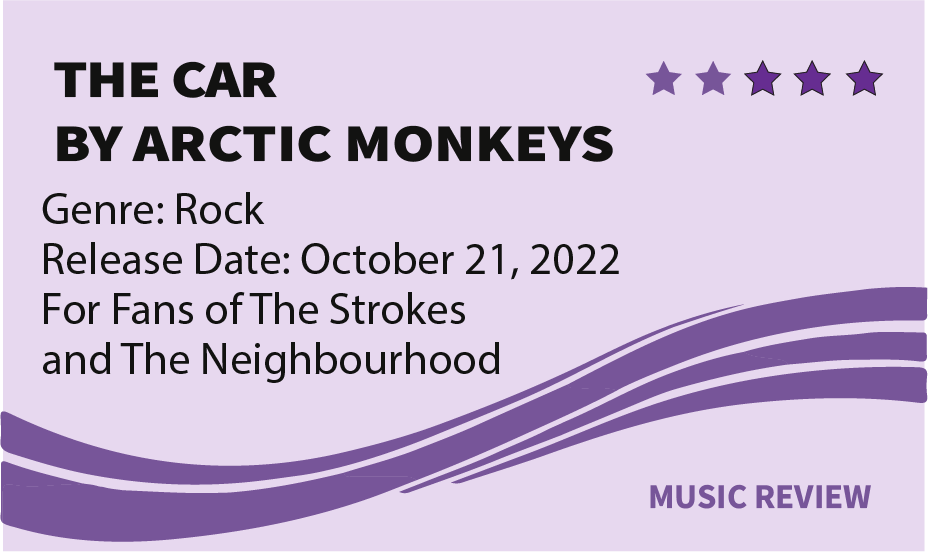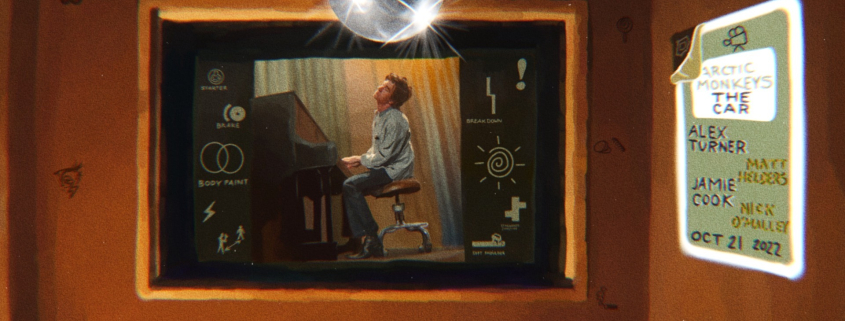Arctic Monkeys’ most heartfelt album yet,“The Car”, has arrived


If Sheffield-originated rock band Arctic Monkeys are consistent in anything, it’s their unapologetic, mold-shattering music. Their artistic versatility is evident in the defiant sonic evolution of their discography, which has topped British charts for the past two decades. Their style is almost unrecognizable in every era: ranging from heavy garage rock, punk rock, indie pop ballads, psychedelic R&B rock, and sci-fi lounge music, to the present orchestrated funk/soft rock. As frontman Alex Turner told Rolling Stone, “I think what makes it sound like the same band is that we’re not betraying our instinct to challenge our idea of what the band can be.” What else can we expect from the band whose debut album was the fastest-selling in UK history and titled “Whatever People Say I Am, That’s What I’m Not”?
As the band grew older, their sound became more refined, meticulous and sophisticated. Turner’s signature poetic songwriting still revolves around coming-of-age themes, except, instead of partying and heartbreak, it’s about maturing and embracing change. Some fans are resisting this evolution since — news flash — growing older is hard to accept. Fans hold on so tightly because they lovingly dub them the voice of their generation — a label Turner openly opposed for the pressure that came with it.
These expectations ultimately constrain the artists, as said in “Sculptures of Anything Goes,” “Guess I’m talkin’ to you now / puncturing your bubble of relativity / with your horrible new sound.” In an interview with Alternative Press, the Monkeys assure they’re not abandoning their old sound, but following what feels like a natural evolution. Turner claims, “nothing about any of this at any point in the last 20 years has given me a reason to believe that you can go backwards.” Their ambition should be commended, not scorned on the basis of personal preference.
The latest culmination of their talents combines all the band’s essential elements — playful and pensive lyrics, energized guitar, sublime piano, plus the integration of strings and Turner’s soothing falsettos. It “begins where the last album left off” with unhurried, luxurious arrangements, wistful sentimentality and infinite allusions. While he managed to create a world of his own in the last record, the polarizing “Tranquility Base Hotel and Casino,” “The Car” provides a method of transportation into various nostalgic worlds. It’s brilliantly atmospheric, transporting the listener into each song by completely immersing them in its textures and vivid imagery reinforced by the romantic vintage aesthetic in the music videos, which were directed by Turner himself and shot intimately on a 60mm camera.
The complex yet seamlessly connected end result was achieved by spending more time than any of their other albums in “post-production”. The album is also comprised of new twists to things that are not entirely new in their catalogue — albeit approached from the present, as hinted by the lyric “there’s just enough time to swing by / and re-address the start / if you call and have them pull around the car / And stop specializing in stories from the road” in the song “Hello You,” which says goodbye to his past personas.
The iconic opening line in “There’d Better Be A Mirrorball” says, “Don’t get emotional, that ain’t like you / Yesterday’s still leaking through the roof / That’s nothing new / I know I promised this is what I wouldn’t do / Somehow giving it the old romantic fool / Seems to better suit the mood.”
Yet, words are one piece in the cohesive whole — the album rewards each replay with a better appreciation for every layer of its spellbinding, retrospective enigma. In an interview with Apple Music, Turner reveals “I think it has as much to do with the other elements that make up the song as it does the lyrics. And like I said before, that instrumental on the front of it… I feel as though the first words are almost reacting to that piece of music”.
The introduction perfectly sets the mood of the album by beginning with expansive piano harmonies, followed by stabs of violin, after which the piano returns crashing as waves of comfort over the listener. In “Body Paint,” the flickering imagery of the lyrics dance along each glistening piano note, then make way for the inexplicable feeling of the guitar riff climax.
In contrast, the ominous “Sculptures of Anything Goes” has a desert-ier musical landscape similar to “Humbug” and was the first song guitarist Jamie Cook co-wrote since their debut album. The entrancing title track, as well as “Mr Schwartz,” begin with gentle fingerstyle guitar, intertwined with Turner’s crooning and feathery impressions left by the orchestra. Turner previously experimented with orchestration in his other band, The Last Shadow Puppets, and even has a movie soundtrack under his belt, since working on “Submarine” in 2011 (for which the acoustic guitar throughout the record is especially reminiscent).
Originally, they’d meant to capture the momentum of live performances back in 2019, but once they got to the studio that impulse “went out the window” so “everything seemed like it wanted to move in this direction”. Even Turner was surprised by the outcome, saying he didn’t expect to want the end of “Body Paint” to be so distorted, yet that’s what he felt fit in the recording studio.
In many ways, “The Car” is Arctic Monkeys’ return to their roots while staying true to their creative impulses in a new facet of their ever-changing sound. It’s refreshing, airy and yet a twinge of melancholy still peeks through each tempo. The album art perfectly encapsulates this feeling: a forlorn car sitting on the top floor of an L.A. parking lot. Hopefully, history will not repeat itself and “The Car” will garner the recognition it deserves without waiting three years for fans to give it a chance only to end up loving it, as was the case for “TBH&C”.
It’s amazing what these artists can accomplish with their independence from the rest of the music scene; it’s precisely what’s kept the band thriving in their decades-long trajectory and, luckily, it seems that’ll remain true for many more years to come.

